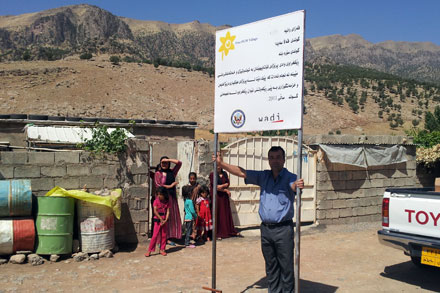FGM-Free Communities Programme
Seven villages in Kurdish nothern Iraq made the start. In most of them the mutilation rate was almost 100%. After learning about the negative effects of female genital mutilation (FGM) and discussing this issue with the team and among themselves, an overwhelming mayority of the women of these villages, especially the young generation, supported the idea of stopping the practice. Not a single case of FGM happened since in any of these villages.
Seven villages in Kurdish nothern Iraq made the start. In most of them the mutilation rate was almost 100%. After learning about the negative effects of female genital mutilation (FGM) and discussing this issue with the team and among themselves, an overwhelming mayority of the women of these villages, especially the young generation, supported the idea of stopping the practice. Not a single case of FGM happened since in any of these villages.

The people appreciated the “incentives”, the small projects Wadi offered, but their stance against FGM developed independently. It is a decision from the heart. Each of the mayors signed a treaty in which he promised to end the practice once and for all. A Stop FGM roadsign was installed at the entrance of the village.
Female genital mutilation, along with other types of violence against women and children, is deeply rooted in local culture. During more than five years of awareness raising Wadi staff has learned that in principle people are ready for a change. The FGM rate has dropped considerably in those areas that received awareness almost from the beginning, i.e. 2004 when Mobile Teams first discovered FGM being practiced in Iraqi Kurdistan.
But we cannot be everywhere. Our resources are limited and the state still does not meet its responsibilities on this field. We needed people to inspire other people in order to create a snowball effect: a movement.
The FGM-free village concept was developed to encourage abandoning the practice and create role models. We support those ready for a change, and we try to make their voices heard, thus encouraging others to follow. Villages may join the network and receive small community projects in exchange for publicly committing themselves to stop FGM and all violence against women and children.
The villages are free to choose the kind of project they would like. One village decided for an electric generator, another wished a community tent, a third one got makeshift classrooms for the broken primary school and for the older pupils transport to a secondary school some miles away. Here is the story of Toutakhel, an amazing village which made it into world press.
All villages receive courses at the women’s choice (sewing, computer, literacy). They are an important means of empowerment of rural women. Aditionally, all villages get First Aid training. In many remote villages, people ask for it because they do not have any hospital or medical service within reach. Emergency cases in these villages cannot be treated early enough. Sometimes, tragedies happen when, for example, a child dies from a scorpion attack because the villagers were not able to bring it to a doctor in time. Exactly this happened in one of the villages just recently.
First Aid courses are an important tool to help people in far-off regions to help themselves. These courses can save lives, and they also increase health awareness in general, i.e. child nutrition, safety at work, care for the elderly, etc.
The FGM-Free Communities Programme is funded by the U.S. State Department.










